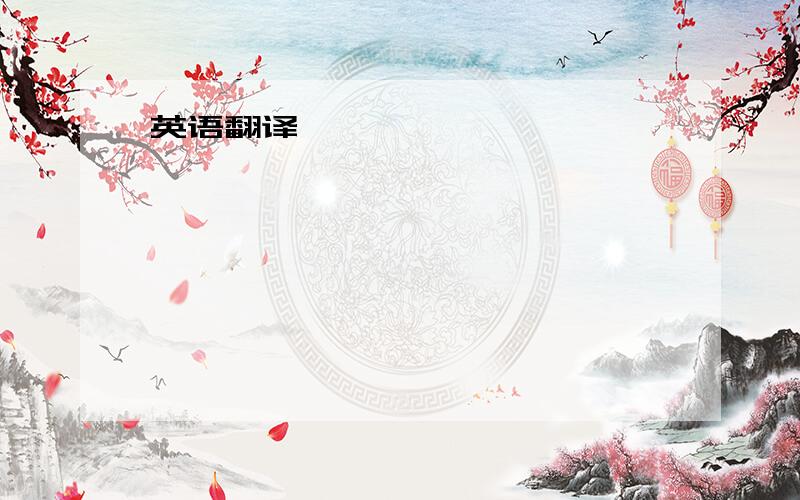英语翻译
来源:学生作业帮助网 编辑:作业帮 时间:2024/12/05 12:39:22

英语翻译
英语翻译
英语翻译
春节和年的概念,最初的含意来自农业,古时人们把谷的生长周期称为“年”.《说文·禾部》:“年,年画谷熟也.”在夏商时代产生了夏历,以月亮圆缺的周期为月,一年划分为十二个月,每月以不见月亮的那天为朔,正月朔日的子时称为岁首,即一年的开始,也叫年,年的名称是从周朝开始的,至了西汉才正式固定下来,一直延续到今天.但古时的正月初一被称为“元旦”,直到中国近代辛亥革命胜利后,南京临时政府为了顺应农时和便于统计,规定在民间使用夏历,在政府机关、矿场、学校和团体中实行公历.1949年9月27日,在中国人民政治协商会议第一届全体会议上,通过了使用世界上通用的公历纪元,把公历的元月一日定为元旦,俗称阳历年;农历正月初一通常都在立春前后,因而把农历正月初一定为“春节”,俗称阴历年.传统意义上的春节是指从腊月初八的腊祭或腊月二十三的祭灶,一直到正月十五,其中以除夕和正月初一为春节的高潮.在春节这一传统节日期间,我国的汉族和大多数少数民族都要举行各种庆祝活动,这些活动大多以祭祀神佛、祭奠祖先、除旧布新、迎禧接福、祈求丰年为主要内容.活动形式丰富多彩,带有浓郁的民族特色.
In the Spring Festival and the concept of the original meaning,the ancient people from agriculture,the valley of the growth cycle called "year".The ministry said evan bluegrass ",posters and ripe."valley In the era XiaLi produced by the moon,the cycle of month,year is divided into 12 months to see the moon on the day of the month for the New Year is called the ShuoRi when,year in and year,also called the name of the zhou dynasty,from the han to the fixed officially,continue to today.But in the first month of the year is called ","until 1911 revolution victory in modern China,nanjing interim government in order to conform to farming and facilitate the statistics,XiaLi used in folk,government agencies,mines,schools and organizations that executes in the Gregorian calendar.On September 27,in 1949,the Chinese people's political consultative conference at the first plenary session,through the use of the world,the era of general of the Gregorian calendar year on January 1st as YangLiNian;,The first day of the lunar year after year,usually on the first day of the first lunar month and known as "festival",celebrated on the fifteenth day.The Spring Festival is a traditional sense from the twelfth lunar month of 23 people sacrifice or until the 15th,with New Year's eve and the first month for the Spring Festival.This is a traditional festival in the Spring Festival in China during the han and the most,ethnic minorities have held various celebration,these activities are to worship,and the worship of ancestors,millennium bringers of good fortune,as the main content.Rich and colorful activities with strong ethnic characteristics.
About the origin of "Spring Festival", have a kind of legend is: ancient China has a kind of call "years" the beast. "Year", head long feelers, fierce abnormalities. "Year" in the seabed, each elder d...
全部展开
About the origin of "Spring Festival", have a kind of legend is: ancient China has a kind of call "years" the beast. "Year", head long feelers, fierce abnormalities. "Year" in the seabed, each elder deep to specific day (New Year's eve) is now just climbed out, swallowed cattle damage lives. Therefore, every day, New Year's eve CunCunZhaiZhai people FuLaoXieYou fled to the mountains, to avoid "nian" damage. A NianChuXi, from the village outside a begging the old man. Village a hurried panic scene, nobody answered him, only village as an old woman gave the old man some food, and urged him quickly up the hill avoid "year", the old man beard pulls up say with smile: "mother-in-law if let me stay at home all night, and I'll get 'years' away." The old woman continue to persuasion, begging the old man smiling without a word. At midnight, "year" rush into village. It found the village atmosphere is different from the village as the family's home, wife: DaGongZhi room door post candle lit. "Nian" was a shake, call loudly. Nearly the door, hospital suddenly spread produced crackling sound, Fried "year" shuddered, again dare not go up. Originally, "nian" most afraid of red, the light of fire, and exploding. At this time, her mother-in-law's door open, see an old man in red's court in laughing. "Nian" was surprised and distressed. Escape flied The second day is the first month, seek refuge back people see the village safe, very surprised. At this time, the old woman is suddenly enlighted, quickly to the villagers told begging the old man's promise. It quickly spread around the village, people know driven "nian" way. Since then, every year New Year's eve put up red couplets, firecrackers, Family candle lit, ShouGeng for years. Kicks in early morning, still walk a friend congratulate. This custom widely spreads, has become China's folk ceremonious traditional festival.
翻译:
关于“春节”的起源,有一种传说是:中国古时候有一种叫“年”的兽。“年”,头长触角,凶猛异常。“年”长年深居海底,每到特定的一天(就是现在的除夕)才爬上岸,吞食牲畜伤害人命。因此,每到除夕这天,村村寨寨的人们扶老携幼逃往深山,以躲避“年”的伤害。有一年除夕,从村外来了个乞讨的老人。乡里一片匆忙恐慌景象,没有人理会他,只有村东头一位老婆婆给了老人些食物,并劝他快上山躲避“年”,那老人把胡子撩起来笑道:“婆婆若让我在家呆一夜,我一定把‘年’赶走。”老婆婆继续劝说,乞讨老人笑而不语。 半夜时分,“年”闯进村。它发现村里气氛与往年不同:村东头老婆婆家,门贴大红纸,屋内烛火通明。“年”浑身一抖,怪叫了一声。将近门口时,院内突然传来“噼里啪啦”的炸响声,“年”浑身战栗,再不敢往前凑了。原来,“年”最怕红色、火光和炸响。这时,婆婆的家门打开,只见院内一位身披红袍的老人在哈哈大笑。“年”大惊失色,狼狈逃蹿了。 第二天是正月初一,避难回来的人们见村里安然无恙,十分惊奇。这时,老婆婆才恍然大悟,赶忙向乡亲们述说了乞讨老人的许诺。这件事很快在周围村里传开了,人们都知道了驱赶“年”的办法。从此每年除夕,家家贴红对联、燃放爆竹;户户烛火通明、守更待岁。初一一大早,还要走亲串友道喜问好。这风俗广泛流传,成了中国民间最隆重的传统节日。
收起